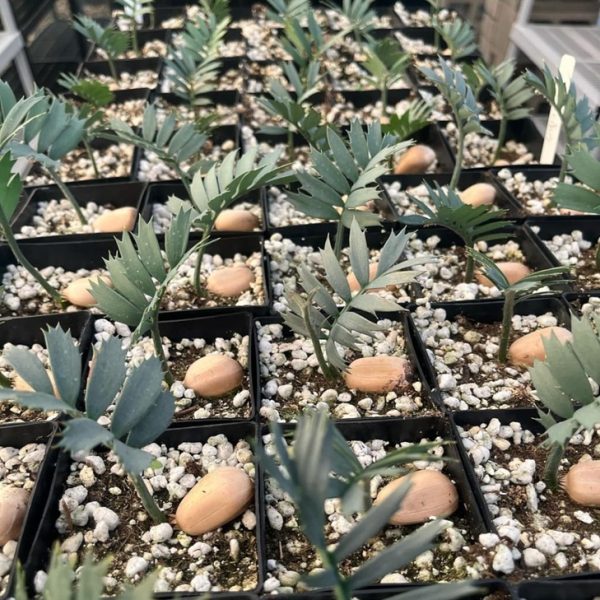Whatapp:
+278.3675.0634
Work Hours
Monday to Friday: 7AM - 7PM
Weekend: 10AM - 5PM

Original price was: $22.00.$18.00Current price is: $18.00.
The Encephalartos horridus seedling is not just a plant—it’s a window into the ancient world. Native to South Africa’s Eastern Cape, this rare cycad is prized for its dramatic, spiny foliage and striking silvery-blue color. As a seedling, it’s the very beginning of a journey that can span centuries. Cultivating this species is an act of both patience and passion.
Even as a seedling, E. horridus stands out. Its young leaves are typically softer and greener than mature plants, gradually developing the iconic blue-gray hue and sharp, toothed edges. While growth is slow, each new flush of leaves reveals more of its prehistoric charm.
This species belongs to the Zamiaceae family, one of the most ancient plant groups on Earth. It has remained largely unchanged for millions of years, making it a true living fossil—perfect for collectors and botanical enthusiasts.
Growing an Encephalartos horridus seedling requires a thoughtful approach:
Light: Provide bright, indirect sunlight during the early stages. Mature plants thrive in full sun, but young seedlings need protection from harsh rays.
Soil: Use a well-draining, gritty soil mix—think cactus mix with added perlite or pumice.
Water: Water sparingly. Allow the topsoil to dry out between waterings. Overwatering is a common cause of seedling failure.
Temperature: Keep in a warm, frost-free environment. Ideal temps range from 20–30°C (68–86°F).
Container: Start in a deep pot to accommodate its long taproot and repot only when necessary.
This is a slow-growing plant, with possibly just 1–2 new leaves per year during its seedling phase. But don’t be discouraged—Encephalartos horridus seedlings are strong survivors and, with the right care, can grow into breathtaking specimens over time.
Encephalartos horridus is listed as Endangered in the wild due to over-harvesting and habitat destruction. By cultivating seedlings responsibly, you’re helping reduce pressure on wild populations and preserving a piece of botanical history.
Serious collectors of rare plants
Fans of prehistoric and exotic flora
Gardeners looking for a low-maintenance, drought-tolerant showpiece
Indoor or greenhouse growers in cooler climates
Whether you’re just starting your collection or adding a rare jewel to your cycad lineup, the Encephalartos horridus seedling is a worthy investment in beauty, rarity, and ancient legacy.
admin_homi –
Proin eget tortor risus cras ultricies ligula sed magna dictum porta sed porttitor lectus nibh vamus suscipit tortor.